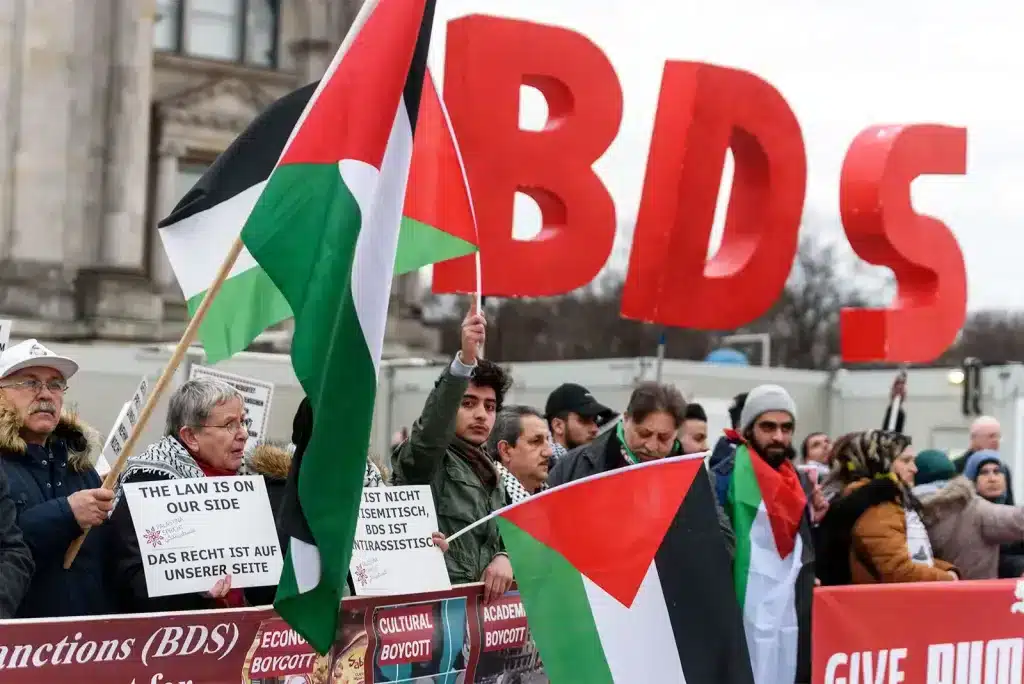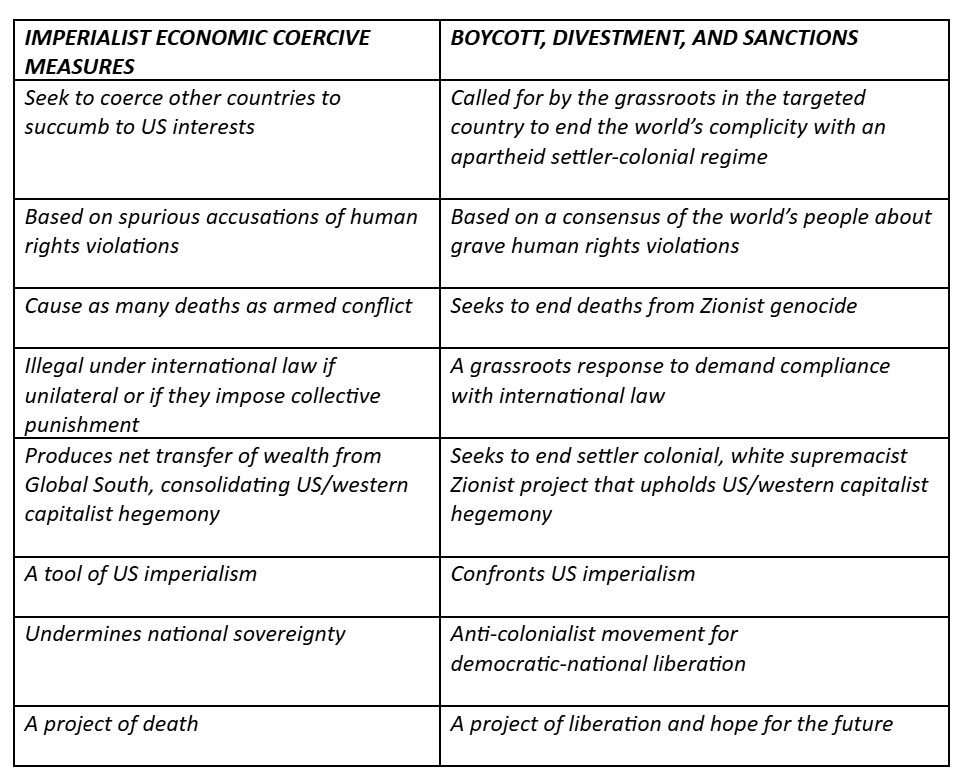
Movement Supporters of the Boycott, Divestment, Sanctions (BDS) movement protesting in front of the German Reichstag (parliament), Berlin, May 17, 2019. File photo.

Orinoco Tribune – News and opinion pieces about Venezuela and beyond
From Venezuela and made by Venezuelan Chavistas

Movement Supporters of the Boycott, Divestment, Sanctions (BDS) movement protesting in front of the German Reichstag (parliament), Berlin, May 17, 2019. File photo.
By Jill Clark-Gollub – Sep 10, 2025
The SanctionsKill campaign exposes how US economic warfare kills civilians across the Global South. Meanwhile, the Palestinian-led BDS movement represents a legitimate tool of grassroots resistance against Israeli apartheid.
The SanctionsKill campaign was formed in 2019 to raise awareness of the human cost of the “sanctions”—actually economic coercive measures—imposed by the United States and its allies on over 40 countries, in which one-third of humanity lives. Our coalition of grassroots activists has exposed the suffering and death caused to populations targeted with these measures, particularly among children, the elderly, and people with health conditions. We also strongly support the boycott, divestment, and sanctions (BDS) movement advanced by Palestinian civil society as a legitimate way for grassroots activists around the world to pressure the settler-colonial state of Israel to comply with international law and recognize the Palestinian people’s inalienable right to self-determination.
It is important to understand the distinction between BDS and imperialist economic coercive measures. While this includes legal differences, the most salient feature is that BDS is the peoples’ effort to end their governments’ complicity with Zionist colonial crimes, whereas US “sanctions” maintain imperialist hegemony by forcing countries to submit to US economic and political interests. The BDS movement comes from over a century of struggle for Palestinian liberation, with a global consensus of the world’s people that Zionist apartheid must end, while US-imposed “sanctions” are based on specious accusations of human rights violations to “continue the theft of wealth from the Global South, and preserve racial hierarchy in the international system.”
Some definitions and a bit of history can help to better understand the complementarity of BDS and SanctionsKill.
A definition of sanctions and their legality
The United Nations describes sanctions as restrictive measures imposed by the UN Security Council to enforce international law and maintain or restore peace and security, which may include “complete or partial interruption of economic, communications, or diplomatic relations.” Sanctions imposed unilaterally (without the UN Security Council) violate the UN Charter, and UN bodies are calling for the elimination of “unilateral coercive measures” such as those imposed by the US government. This global consensus is shown in the fact that for over 30 consecutive years, the UN General Assembly has voted almost unanimously to eliminate the US blockade of Cuba; the usual dissenting votes are only those of the US and Israel. Even UN Security Council sanctions are often manipulated by the US to impose collective punishment on civilians, in violation of the Geneva Conventions.
What is BDS and how does it work?
BDS for Palestine is but one expression of a national liberation struggle that has been ongoing since the first Zionist settlement was established in 1878. Evoking the Great Revolt of 1936-39, the decades-long Arab Boycott initiated in 1945, the 1975 UN resolution that declared “Zionism is a form of racism and racial discrimination,” the 1975 Organization of African Unity resolution that called for support of Palestine against “Zionist racist colonialism,” and the Intifadas, the international divestment movement started in 2000 and was relaunched as boycott, divestment, and sanctions (BDS) in 2005. It derives inspiration from the Anti-Apartheid Movement (AAM) of South Africa which led hundreds of thousands of ordinary citizens around the world to boycott goods from the Apartheid state from the 1950s to 1994. Students, churches, trade unions, and local groups pushed governments and businesses to divest. There was a cultural boycott and South Africa was banned from the Olympics and from FIFA competition between 1964 and 1992. “The strength of the international solidarity campaign was that it spoke directly to the ordinary citizen and challenged each one singly, and communities collectively, to take action.”
UN sanctions were also imposed on South Africa (including an arms embargo undermined by Israel), and the country was suspended from the UN General Assembly from 1974 to 1994. By the 1980s individual countries, including the US, were imposing sanctions. However, it seems that the boycott movement was more impactful than official sanctions, causing a “privately induced financial crisis — the repercussions of which were substantially greater than any of the public sanctions that ensued.” BDS against apartheid South Africa was a complement to the most important factor in bringing down the apartheid regime—the resistance of Black South Africans on the ground, including armed struggle.
The movement for BDS against Israeli apartheid has been accelerating since the start of the livestreamed genocide in October of 2023. This grassroots movement led by Palestinians in Palestine and in the diaspora, is inspiring millions to boycott consumer goods made in Israel and demand that Israeli weapons and surveillance companies be removed from their local economies, governments, and pension funds. Similar to the AAM of South Africa, billions of dollars have now been divested from the Zionist economy. Campaigns such as “Apartheid Free Communities” have moved public discourse towards an acknowledgement of the unjust, racist treatment of the Palestinian people. Divestment is again the rallying cry of students demanding an end to their universities’ complicity in human rights abuses, and there is an academic and intellectual boycott and call to ban the Israeli settler-colonial state from the Olympics and FIFA competition.
While the genocide takes the form of forced starvation, the world’s people are sickened to see that governments and international organizations are incapable or unwilling to stop atrocities committed in plain sight. In response, many have taken matters into their own hands through boycott and divestment. And as in South Africa, BDS is a complement to the main struggle on the ground in Palestine.
The BDS movement says that boycott and divestment necessarily come before sanctions, in order to build “a crucial mass of people power to make policymakers fulfill their obligations under international law.” It is an effort to move toward binding UN Security Council sanctions to oblige Israel to comply with the many General Assembly resolutions and International Court of Justice rulings demanding an end to Israel’s apartheid and genocide.
‘Israel’ Continues to Level Gaza Towers, Residents Defy Displacement
How do US “sanctions” work?
In contrast, the unilateral coercive measures (“sanctions”) promoted by the US are not intended to uphold international law or support peace and security, but rather to deliberately impose collective punishment on civilian populations in order to bring about regime change. This was revealed in a 1960 memo by a US diplomat explaining that a blockade of Cuba would “bring about hunger, desperation and overthrow of government.” The United States government imposes these measures on countries that try to develop economic or political systems independent of US domination. And given the US’ “exorbitant power to sanction” due to the dominant role of its dollar in international trade and banking transactions, these measures are very impactful.
Economic coercive measures punish populations by impacting global trade, thus making it hard to import food, fuel, medicines, and parts to maintain civilian infrastructure. One consequence is the inability to import chemicals and parts to maintain water supply systems, causing severe shortages of clean drinking water, leading to massive child deaths.
Even UN sanctions can be manipulated for imperialist purposes. As Doa Ali said in How to Kill an Entire Country, “Iraq is a case in point of how the US has captured the UN Security Council’s sanctioning capacity using it to impose its own ‘rules-based global order’ and further its imperialist interests, regardless of the human cost.” In 1990, after the Iraqi invasion of Kuwait and as the Soviet Union was collapsing, the US was able to engineer and oversee the imposition of severe UN sanctions on Iraq. These led to the deaths of over half a million Iraqi children from water-borne illnesses, vaccine-preventable diseases, and hunger—in a country that had achieved one of the highest per capita food production rates in the region. In the US-controlled committee that oversaw enforcement of the sanctions, the US ensured that “humanitarian exceptions” were denied and that “food itself was not considered a humanitarian necessity.”
US-promoted sanctions have killed over 100,000 Venezuelans since 2017, and 12% of child deaths in Palestine prior to October 2023 were from lack of clean drinking water due to the US-supported Israeli blockade. Further evidence that sanctions kill is the new report in the medical journal The Lancet which found that sanctions cause some 564,000 deaths annually—similar to global mortality from armed conflict—with 51% of the victims under age 5.
US-imposed coercive measures are based on extractive interests, dubious accusations of deficient democracy, and spurious charges of human rights violations, such as the allegation that Cuba is “trafficking” its doctors (they are actually proud participants in a renowned humanitarian project) and that Cuba is a State Sponsor of Terrorism (SSOT) because it hosted peace talks for Colombia. The SSOT allegation makes it extremely hard for a country to conduct any banking transactions, and together with the 63-year blockade, has caused a humanitarian crisis in Cuba. Such sanctions supposedly imposed to protect human rights are in fact the worst violators of human rights.
Conclusion
As hope grows for a Free Palestine sooner rather than later, it is time to lift the siege on Gaza that has been blocking desperately needed supplies since 2007. The “exorbitant sanctioning power of the US” on all the countries of the region – including Iran, Iraq, Lebanon, Syria, Yemen, Libya—will also end as these countries find alternative trade and financial arrangements, such as the BRICS, and a new multipolar order emerges.
The BDS movement to end Zionist violence, and the SanctionsKill campaign to abolish U.S. economic coercion, are not separate causes, but one movement for justice, sovereignty, and human dignity. Together they embody grassroots power against imperialist violence. They are people-led projects of hope and liberation, demanding a future free from the economic coercion that results in genocide, collective punishment, and colonial domination.
Differences between Imperialist Economic Coercive Measures and Boycott, Divestment, and Sanctions
